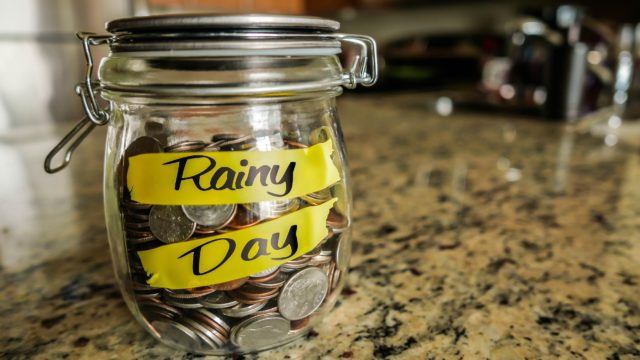10th June 2021
The last 18 months have reminded us that unexpected events can happen at any time. From mundane issues such as your car breaking down to life-altering illness or redundancy, you’re never quite sure when you’ll be blindsided by something out of your control.
One of the ways to achieve financial security is to save a pot of money that you can access when the unexpected happens.
However, in a recent Opinium survey of 2,000 UK adults, one in four people said they had no emergency savings at all. And, more than half of respondents who have experienced unexpected expenses had to borrow to cover them – with all the interest and debt that entails.
Building and maintaining a rainy day fund can help you to deal with irregular expenses. Here are five things to know.
1. You need to have some cash savings
According to the Opinium survey, nearly four in ten people suffered expenses out of the blue in the last year. The study reported that these weren’t small amounts either – the average cost was £1,420.
Unexpected events can happen at any time. It might be something specific, like a leaking roof or a broken boiler. It could be that you’re forced to take time off work due to ill health for a spell. Or, as the pandemic has shown us, it could be that your income takes a hit if you face a period out of work.
While a year of lockdown restrictions might be an extreme example, it does highlight the need to have a rainy day fund in place. Without it, you may end up having to borrow money to cover unexpected expenses – and this is likely to increase the overall cost and put you into debt.
Having a dedicated rainy-day fund set aside ensures you have the peace of mind that you can cover short-term disruption and makes your finances more resilient.
2. Hold three to six months’ worth of essential expenses
So, you’ve established that you should keep an emergency fund. But how much should you hold?
The answer to this question will differ for every individual. There’s no specific amount that a financial planner will tell you to hold, as it depends on a range of factors.
As a general rule, holding three to six months’ worth of essential expenditure is sensible. Base the amount you hold on your expenditure rather than your income, as these are the commitments you have to make if something unpredictable happens.
Essential expenditure includes things like your mortgage or rent, food, utility bills, Council Tax, and insurance.
If you’re retired, it could be worth considering holding a larger amount in your easy access savings. This can be prudent when it comes to managing fluctuating drawdown income and dealing with stock market volatility.
3. Shop around for the best savings rate
One of the key things to remember when setting up a rainy day fund is to ensure you can access the money quickly. If your car breaks down, you don’t want to be waiting 90 days to access your cash!
It makes sense to hold your money in an easy access savings account where you can get at it quickly if you need to.
However, leaving the money in your bank account means it’s unlikely to generate much in the way of returns. Many instant access accounts pay no more than 0.01% currently – that’s £1 interest a year on £10,000 – so it’s important to shop around.
If you haven’t used your annual ISA allowance then an instant access Cash ISA can be a good way of generating a slightly better return on your savings.
4. Strike a balance between your rainy day fund and wider savings
While it’s important to make sure you have enough in your emergency fund to cover any short-term issues, you should also try and ensure you don’t have too much cash in a low interest account.
The reason for this is that cash savings are unlikely to keep pace with rises in the cost of living. We’ve looked previously about why this matters and how inflation can eat into the value of your hard-earned savings over time.
The balance will be different for everyone, and will depend on factors such as:
- How much you need in your emergency fund
- Your tolerance for risk
- Your other assets
- Your long-term plans and goals.
If you’re not sure quite how much to keep in an easy access account it can pay to seek advice, which brings us to…
5. Seek advice if you’re not sure
As we have mentioned, the amount that you’ll need to keep in your rainy day fund will depend on a range of factors. Your age, your expenditure, your other assets, and your long-term plans will all have an impact.
So, it can pay to seek professional advice when it comes to allocating your resources. Striking a balance between being prepared for short-term disruption and investing for your future can give you the peace of mind that all outcomes are considered.
If you’d like to discuss your emergency fund or your savings and investments, please get in touch. Email info@depledgeswm.com or call 0161 8080200.
Please note
Equity investments do not afford the same capital security as deposit accounts. The value of your investments (and any income from them) can go down as well as up and you may not get back the full amount you invested. Past performance is not a reliable indicator of future performance. Investments should be considered over the longer term and should fit in with your overall attitude to risk and financial circumstances.

Comments on 5 things Covid has taught us about having a rainy day fund
There are 0 comments on 5 things Covid has taught us about having a rainy day fund